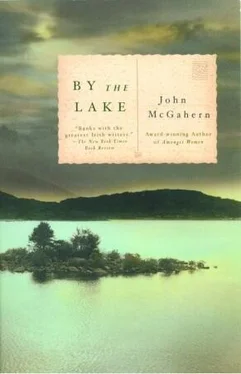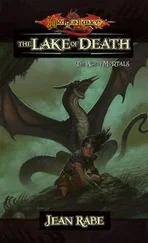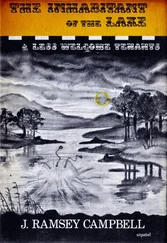Lucy was his daughter-in-law, and Jamesie went quiet as if struck. She was one of the few people he had never been able to charm; it was a deep sore. “Some of these ones would want you tailor-made. Some of these ones are just too precise,” he said, and they were all too fond of him to say another word until he recovered and a path was found out of the silence.

The Shah rolled round the lake with the sheepdog in the front seat of the car every Sunday and stayed until he was given his tea at six. Some days during the week he came in the evenings as well. On dry Sundays he loved to walk the fields, and to look at the cattle and sheep and the small wooded island out in the back lake where the herons nested, and to look across the lake to the acres of pale sedge of Gloria Bog, which ran like an inland sea until it met the blue of the lower slopes of the mountains where his life began, the stunted birch trees like small green flowers in the wilderness of bog.
When it was raining or there was little to be done, he was content to sit in the house. Often he sat in silence. His silences were never oppressive and he never spoke unless to respond to something that had been said or to say something that he wanted to say. Throughout, he was intensely aware of every other presence, exercising his imagination on their behalf as well as on his own, seeing himself as he might be seen and as he saw others. Since he was a boy he had been in business of some kind but had never learned to read or write. He had to rely on pure instinct to know the people he could trust. This silence and listening were more useful than speech and his instinct was radar-sharp. His manners had once been gentle and hidden with everybody but to some extent the gentleness had been discarded as he grew in wealth and independence. With people he disliked he could be rough. People or places that made him ill at ease or uncomfortable he went to great lengths to avoid. When caught in such situations his manners would turn atrocious, like a clear-sighted person going momentarily blind. Where he blossomed was in the familiar and habitual, which he never left willingly. The one aberration of his imaginative shrewdness was a sneaking regard for delinquents, or even old villains like John Quinn, whose activities excited and amused him, as they tested and gave two fingers to the moral world.
All his family, dominated by the mother, had been hardworking, intelligent, humorous, sociable. Across from the three-roomed cottage, the whitethorns had been trained to make an arch into the small rose garden, and a vine of roses covered the whitewashed wall when few houses on the mountain had more than the bare necessities. They also kept bees, had a small apple garden, ground coffee from dried and roasted dandelion roots; and when they got some money a room would be added to the house rather than building another outhouse to keep more fowl or animals.
He alone in the family escaped school. A dedicated but ill-tempered schoolmaster, who had been instrumental in his older brother and sister becoming the first to win scholarships out of these mountains, had given him a bad beating during his first year at school. No amount of coaxing or threats could get him to return. At twelve, he made his first shillings by borrowing the family horse to draw stones to make a road to the new national school where his sister taught. His first job was in a local sand and gravel pit, where he learned to weld and fix machinery; soon, he was driving a sand lorry for the pit, and then purchased an old lorry of his own, drawing merchandise to and from the Belfast and Dublin docks. On the potholed roads it was more important to be a good mechanic than a driver, and by his early twenties he had four lorries of his own. At the outbreak of the war he switched into tillage contracting and made serious money.
Seeing compulsory tillage about to disappear with the ending of the war, he sold out early, preserving and increasing the money he had made. For a few years he had a sawmill before buying the railway station, its land and buildings and some miles of track, when the small branch line was closed. In the middle of a long recession it went cheaply and he had to borrow very little. A bank manager he knew from the town card school gave him the loan, which he quickly repaid by dismantling and selling off the track, rails and sleepers and buildings that he didn’t want. At thirty, he owned a small empire and had no debts at a time when only the old established traders, the priests, the doctors, the big farmers had money and all the trains to the night boats were full. From such a position many men of his age would have expanded; he contracted. The only regular employment he gave was to a young boy, taciturn and intelligent, from a house close to his own on the same part of the mountain. Whenever he needed other workers he employed casual labour. When what was left of the railway line was broken up and sold off or stored, he began to buy old lorries, tractors, farm machinery to sell for spare parts and to put down fuel tanks. And when the four small railwaymen’s cottages that had come to him with the station became vacant, he installed bachelors he knew who had grown too old to work their mountain farms and wanted to move into the town. He charged them no rent and in return they helped about the sheds and in the big field of scrapped machinery on the edge of the town, while they were able. They were all silent, withdrawn people who spoke little, but seemed to understand one another perfectly and to get on well together without talking. When they died or had to go into the Home, he replaced them from the same stock, much as he replaced the black-and-white sheepdogs he was attached to. He did not drink or smoke and his fondness for cards was profitable. His luxuries were the new, expensive cars he liked to drive and the big meals he enjoyed every day in the hotel. With thick curly brown hair, an alert, pleasant appearance, his manner easy and assured, he was attractive to women in spite of an unconcealed, long-held determination to avoid marriage as he had avoided school. When he had the lorries on the road, he had several girls, all of them small and pretty; and then after a few years there was just the one girl, small too and pretty, Annie May McKiernan, and for nine years they went out together, meeting on the same two evenings every week.
He called for her in his big car where she lived with her parents and brother on their comfortable farm. They went to dances and films and the local plays. Gradually, he became almost another member of her family, helping her brother with the machinery on the farm, driving her parents to the seaside at Strandhill and Bundoran and later to Manorhamilton Hospital.
When her father and then her mother died, he was as helpful and as present about the house as any member of the family, but soon afterwards her brother wanted to marry and bring a young woman into the house. Pressure was put on Annie May and on her suitor of many years. As they exchanged presents that Christmas while sitting in the big car, she said, in her placid way, “Aunt Mary wants me to go out to her in New York. You know, if something doesn’t happen soon I think I’ll go out to America around Easter.”
It would not have been possible for her to be more direct, and he understood perfectly. There must have been an interminable silence, but the same negative resourcefulness that had frustrated every attempt to force him to go back to school won out over affection and scruples.
“You know, Annie May, with the way this country is going I doubt but America will be the end of us all yet.”
No door was ever closed more softly or with more finality. She did not go to New York at Easter but married old Paddy Fitzgerald, a cattle dealer, in an arranged match.
Читать дальше













